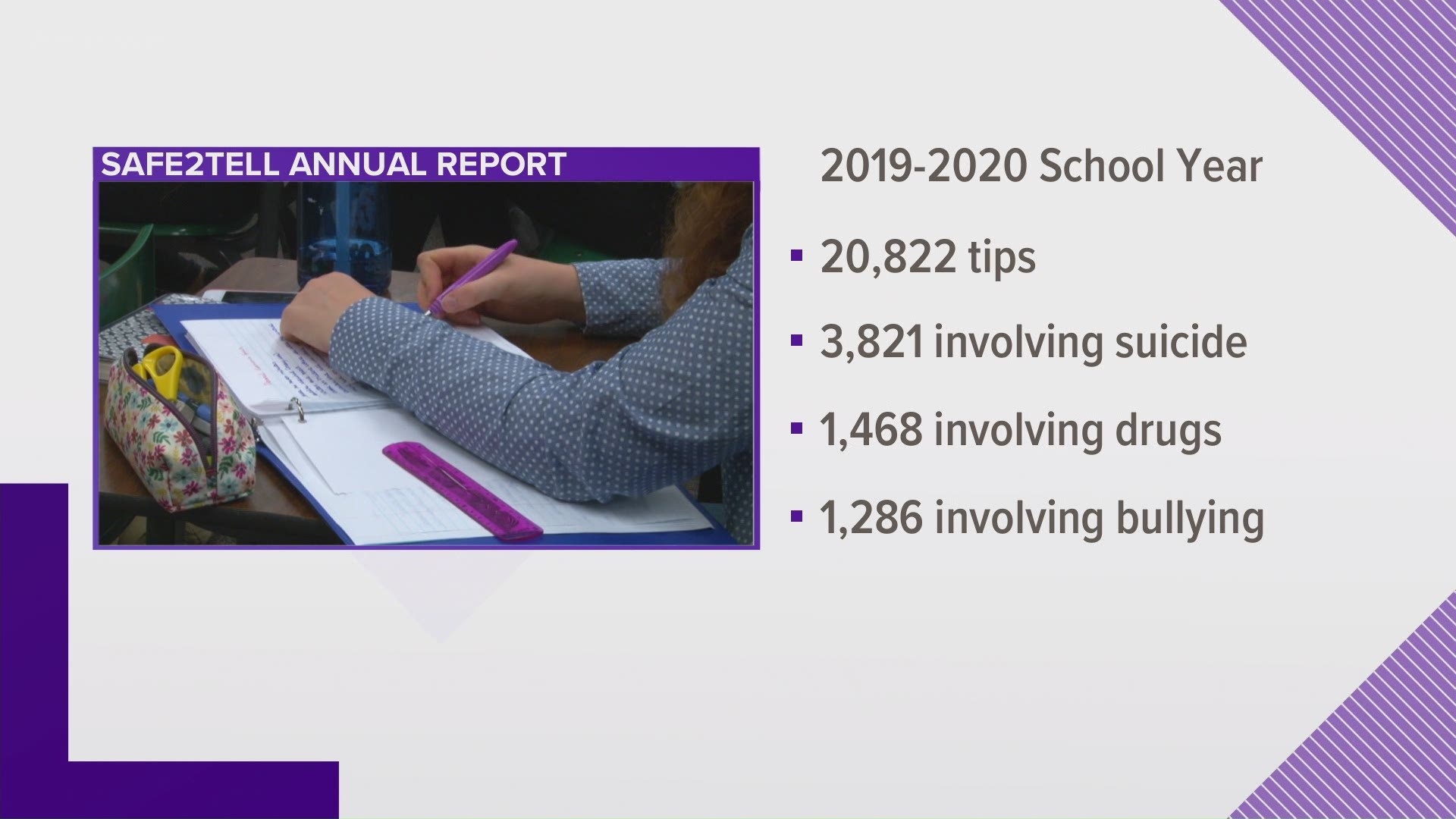DENVER — Safe2Tell said they received a total of 20,822 tips from Aug. 1, 2019 through July 31, 2020 — a 7% decrease in tips from the previous school year.
At the top of the list, tips involving suicide (3,821), drugs (1,468) and bullying (1,286) remained as the highest threats reported to Safe2Tell.
Safe2Tell is a violence intervention and prevention program for youth and community members to report threats to their own and others' safety anonymously.
"Coloradans have felt the deep impacts of the pandemic as we navigate these unprecedented times together," said Safe2Tell Program Director Essi Ellis.
Actional tips total 91.8% for the year, which Safe2tell said excludes test tips, duplicate reports, pranks and hang-ups. The program received 2.1% false tips, which is a reduction from 2.4% in the 2018-2019 school year.
"Moving forward, we will redouble our effort to increase awareness about situational anxiety and isolation-induced stressors," Ellis said. "We will continue to encourage all youth and community members to utilize this valuable and anonymous safety reporting tool, along with accessing the other excellent resources across our state."
The program listed a few recommendations in their report to improve based on the data they collected. Some ideas include increased training and collaboration between the program, schools and law enforcement agencies.
More about Safe2Tell
Safe2Tell Colorado was initially a nonprofit organization after the 1999 Columbine massacre.
Safe2Tell is not an emergency response unit, nor does it provide crisis counseling services; it is a conduit of information for distributing anonymous tips to local law enforcement, school officials and other appropriate responding parties according to state law.
To make a report, individuals can call 1-877-542-7233 from anywhere, 24 hours a day, seven days a week. Reports also can be made at Safe2Tell.org or through the Safe2Tell mobile app, which is available on the Apple App Store or Google Play.
SUICIDE & MENTAL HEALTH RESOURCES
The National Suicide Prevention Lifeline provides free and confidential support for those in crisis 24/7 at 1-800-273-8255.
There are four ways to get confidential and immediate help: by phone at 1-844-493-8255, over text message (text the word "TALK" to 38255), via online chat service, or at walk-in centers throughout metro Denver, northern, the southeast region and the western slope. Many of these services are available 24/7.
Trained counselors are available to help with relationship problems, depression, bullying, stress, suicidal thoughts, substance abuse, family crisis and more.
This advocacy organization hosts a variety of online mental health screening in both English and Spanish, a mental health toolkit for schools, a page dedicated to the latest mental health research, and a variety of events throughout the year.
Using this link, you can find the community mental health center nearest to you. All centers accept Medicaid, and most have sliding payment options for those who do not have insurance.
SUBSTANCE ABUSE RESOURCES
Find meetings throughout Colorado and information about the program and other services and events put on by AA.
A division of UCHealth, CeDAR offers 30- to 120-day residential treatment programs, outpatient treatment programs, medically-supervised detox programs, and recovery management.
The Substance Abuse Treatment, Education and Prevention Program was established to help teens and young adults from 11 to 24 years of age. It offers a 12-week outpatient program on the campus of Denver Health and in several Denver Public Schools.

